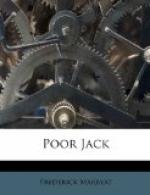“The tide of ebb
it was not done,
But fiercely to the
west did run;
Which put us all in
terrible fear,
Because there was not
room for to veer.
The wind and weather
increased sore,
And drove ten sail of
us on shore.
“Ashore went the
‘Northumberland,’
The ‘Harwich,’
and the ‘Cumberland,’
The ‘Lion’
and the ‘Warwick’ too;
But the ‘Elizabeth’
had the most to rue—
She came stem on—her
fore-foot broke,
And she sunk the ‘Gloucester’
at one stroke.
“But now remains
what is worse to tell,
The greatest ships had
the greatest knell;
The brave ‘C’ronation’
and all her men
Was lost and drowned
every one,
Except the mate and
eighteen more
What in the longboat
com’d ashore.
“And thus they
lost their precious lives;
But the greatest loss
was to their wives,
Who, with their children
left on shore,
Their husbands’
watery death deplore,
And wept their loss
with many tears—
(But grief endureth
not for years).
“Now you who’ve
a mind to go to sea,
Pray take a useful hint
from me,
And live at home, and
be content
With what kind Providence
has sent;
For they were punish’d
for their misdeeds,
In grumbling when they
had no needs.
“Now God preserve
our noble Queen,
Likewise her Ministers
serene;
And may they ever steer
a course
To make things better
’stead of worse,
And England’s
flag triumphant fly,
The dread of hevery
he-ne-my.”
“You call dat singing! Stop now! I sing a song you nebber hear in all your life,” cried Opposition Bill, tuning his fiddle.
“And never wish to hear again, most likely,” replied Dick. “Out with it, Bill; your face shines beautifully this morning.”
“I take de shine out of you, Massa Dick; now you listen:
“Now your fader
is asleep, maid, listen unto me;
Will you follow in my
trail to Ken-tuck-y?
For cross de Alleghany
to-morrow I must go,
To chase de bounding
deer on’de O-hi-o.
“And will you
lub me truly, and kind to me will be,
If I quit my fader’s
roof for Ken-tuck-y?
And will you nebber
leave me, if I consent to go
To your shanty by de
stream of de O-hi-o?
“Her fader’s
not asleep, and he will not agree,
Dat you take away his
dater to Ken-tuck-y.
So alone by yourself,
good hunter, you must go,
Where the Ingin’s
rifle cracks on de O-hi-o.
“Your moder, too,
is near, aldough you did not see,
And wid her leave you
nebber go to Ken-tuck-y.
He hab a wife already,
as I do surely know,
Who weeps for his return
to de O-hi-o.
“Man, I have dis
purse of gold, half of it for ye;
Woman, I hab ne’er
a wife in Ken-tuck-y;
Your dater is my only
lub, so pridee let us go
To where my corn is
ripening on de O-hi-o.




